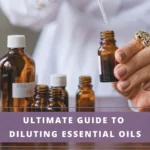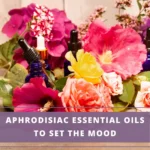As an Amazon Associate I earn from qualifying purchases. See Full Disclosure Here
Our respiratory health is more important than many of us realize. Breathing is the only way to supply our body with the oxygen it needs and expel unwanted toxins from the body.
Both of these processes have to work efficiently for us to stay healthy. When our respiratory health is compromised, it adversely impacts our other systems.
A steady supply of oxygen supports the health of the brain, nerves, other organs and more. The brain is the powerhouse of the body and requires the most energy of all of the body’s organs. When it does not get the oxygen it needs, the whole body gets affected.
Aromatherapy is a gentle yet effective way to boost respiratory health and combat respiratory difficulties without the adverse effects that are common with the over-the-counter medication.
How Aromatherapy Works to Support Respiratory Health
Aromatherapy and the use of healing essential oils originate from ancient times in Eastern culture. In recent years it is becoming more and more common in contemporary western applications too.
Aromatherapy uses essential oils to stimulate our sense of smell. This triggers connections within the brain of other memories and emotions that may have been forgotten. This is in effect the olfactory system communicating with the limbic system.
Aromatherapists believe that stimulating particular memories or emotions with essential oils has endless healing powers. Think of a time when a certain smell conjured up a sweet childhood memory or another made you wince because it triggered off unsavory memories.
This happens because our sense of smell has to power to revive memories associated with a certain scent, and it can stir us and transform our moods. It can also be therapeutic in nature when the right scent reaches that sense.
Essential Oils for Breathing and Sinuses
The healing oils used in aromatherapy are produced from a wide range of organic substances such as herbs, flowers, leaves, bark and more. These organic materials are extracted and distilled into essential oils. Some of these essential oils are great for use as a holistic health approach when treating sinus and breathing conditions.
Eucalyptus
Eucalyptus essential oil is one of the most effective for clearing nasal congestion and fighting inflammation. It can be applied to get rid of mucus build-up and to help open up the respiratory system.
Eucalyptus use results in noticeably increased circulation, which allows for better oxygenation of the blood.
Rosemary
Studies have shown that rosemary essential oil has many similar effects as eucalyptus. It can be used to help open up respiration, clear up congestion, fight inflammation and improve blood flow.
The aromas of rosemary are milder than that of eucalyptus, making it gentle enough for a young child or for remedying minor ailments.
Peppermint
Peppermint essential oil is great for use in easing congestion and reducing the intensity of headaches.
The antiseptic and anti-inflammatory effects of the mint allow for breathing that is more comfortable as the mint opens the sinuses. In addition, the cool and minty aroma soothes the entire system.
Wintergreen
Wintergreen is another type of mint oil, with similar effects as that of peppermint essential oil.
Applying wintergreen will have an anti-inflammatory and stimulating effect. With mint oils, your breathing passages will be open and soothed.
Melaleuca
Melaleuca has antibacterial, antiviral and anti-fungal qualities. It is often called the “miracle oil.”
This versatile essential oil can be used to fight off respiratory illness in conjunction with a comforting oil.
How to Use Aromatherapy and Essential Oils for Respiratory Health
Aromatherapy can be extremely helpful in the treatment of your sinuses and breathing concerns. Here are a couple of recipes that will give you the benefits of aromatherapy for respiratory health.
- Recipe for Inhalation: Blend together 6 drops rosemary with 3 drops each of eucalyptus and geranium essential oil. Store the blend in a dark-colored glass bottle. Put 1-2 drops on a tissue or on your pillow cover and inhale.
- Recipe for diffusion: Put 1-2 drops of eucalyptus, thyme and tea tree oils into your favorite diffuser and inhale the aromas. These oils are invigorating and may not be ideal for use at night. To get into a more relaxed mood during the latter part of the day, put a few drops of marjoram or wintergreen oil in the diffuser.
When using aromatherapy and essential oils for respiratory health, you will find that some work better than others for you or it could be that you favor the aroma of one type of oil over the other. You may prefer the milder aroma of rosemary essential oil while somebody else may find that the stronger, heady aroma of eucalyptus oil works better for them.
Explore the many different types of oils and decide what is best for you and your personal needs. With that knowledge, you will be ready to apply essential oils through inhalation, massage and ingestion. You will immediately benefit from improved respiratory health.
Aromatherapy Solutions for Common Respiratory Problems
Take a look at some of the more common respiratory problems and the corresponding treatments using essential oils:
- Allergies: Apply 1-2 drops of chosen oil on the chest area and reflex points daily. This will help enliven your respiration and combat allergies.
- Cough: Diffuse oil or blend of oils into space around you. Also, apply to chest several times a day to comfort cough.
- Emphysema: Use oil to massage over the chest and throat at least twice daily.
- Nasal congestion: Massage a small amount of oil under the sinuses and nose to invigorate breathing. You should dilute the oil with water and be cautious of your eyes.
- Respiratory infection: Liberally massage oil over chest and throat at least two times a day. Also, apply oil onto the feet’s reflex points.
The best carrier oils to use are jojoba, coconut, sweet almond, argan, macadamia and grapeseed.
Sinus and breathing ailments are common among many people, especially with changing seasons and allergies. In order to keep your brain and body functioning optimally you can take certain steps to improve your breathing.
Explore the different essential oils mentioned above and formulate the best routine for you. With the right oil or combination of oils, you can improve your respiration and overall health.
Have you tried using aromatherapy for better respiratory health? Did it work for you? Let us know in the comments below so we could also learn from your experience.
Disclaimer: This information is not intended to serve as medical advice. Please consult your physician before using essential oils. See Full Disclaimer here.










